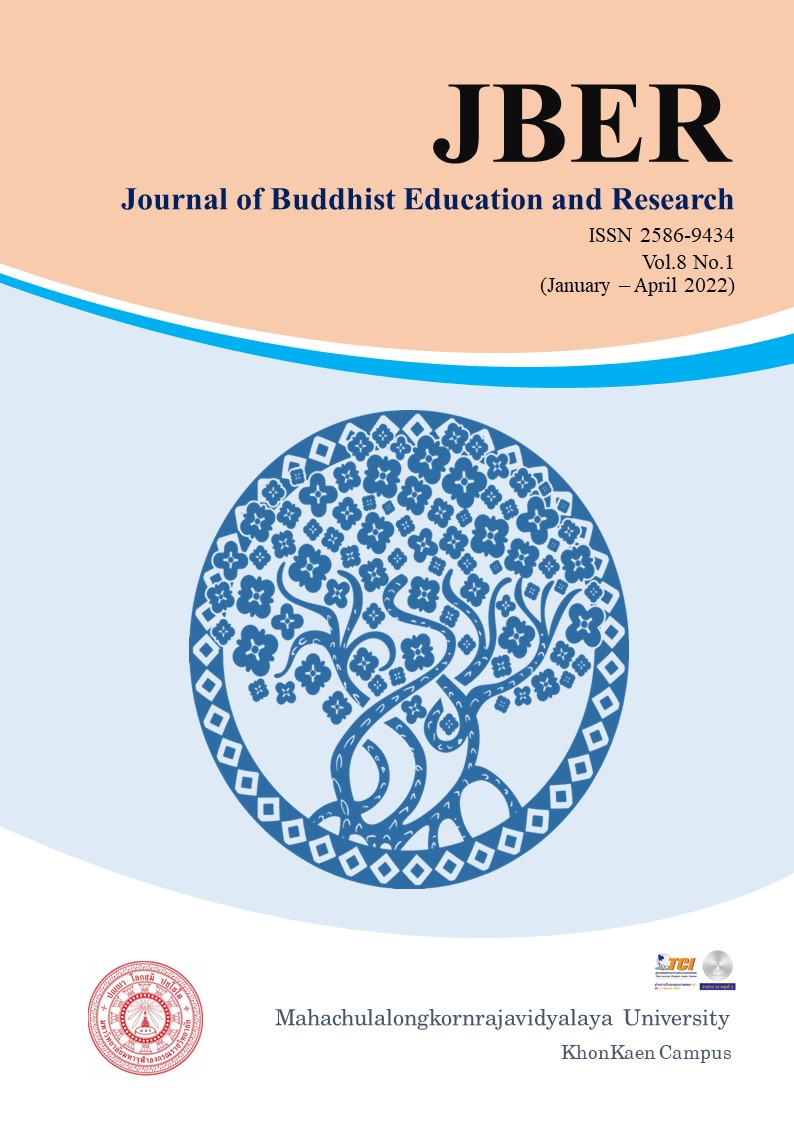DEVELOPMENT OF TRANSFORMATIONAL LEADERSHIP BASED ON IV BHÃVANÃ PRINCIPLES OF SCHOOL ADMINISTRATORS UNDER THE OFFICE OF PATHUM THANI PRIMARY EDUCATIONAL SERVICE AREA 1
Keywords:
Transformational Leadership; IV Bhavana; School AdministratorsAbstract
The objectives of this research are: 1) to study the current state of transformational leadership of school administrators under the Office of Pathum Thani Primary Educational Service Area 1, 2) to study method for enhancement of transformational leadership based on Bhavana principles of school administrators under the Office of Pathum Thani Primary Educational Service Area 1, and 3) to propose the guidelines for enhancement of transformational leadership based on Bhavana principles of school administrators under the Office of Pathum Thani Primary Educational Service Area 1. 331 samples used in the study consisted of school administrators and teachers and they were obtained by stratified random. The data were collected by questionnaire with 0.889 reliability value and interview form.
The study results were found that:
- The current state of transformational leadership of school administrators under the Office of Pathum Thani Primary Educational Service Area 1 in total and in aspect was at a high level. The highest level was on situational administration, followed by integrated strategy, behavior and leadership characteristics respectively.
- The enhancement method of transformational leadership based on Bhavana principles of school administrators under the Office of Pathum Thani Primary Educational Service Area 1 was at a high level overall. The highest practical level was on leadership characteristics based on Bhavana principles, followed by devotion to work and distinguished characteristics of the leader respectively.
- The guidelines for enhancement of transformational leadership based on Bhavana principles of school administrators under the Office of Pathum Thani Primary Educational Service Area 1 are as follows: In behaviors; the administrators have to be compatible with everyone, enthusiastic in duty and satisfied in their work; In situational administration, the administrators must be alert and keep in touch with administrative changes and encourage the co-workers to learn new things with Bhavana principles; In integrated strategy, the administrators must enhance and support co-workers and subordinates to use technology in assisting teaching and learning based on intellectual development.
References
กระทรวงศึกษาธิการ (2553). พระราชบัญญัติการศึกษาแห่งชาติ พ.ศ.2542 แก้ไขเพิ่มเติม.(ฉบับที่ 2).พ.ศ.2545 แก้ไขเพิ่มเติม (ฉบับที่ 3) พ.ศ. 2553. กรุงเทพฯ: พริกหวานกราฟฟิค
พระครูภัทรธรรมคุณ. (2554). การศึกษาภาวะผู้นาของผู้บริหารการศึกษาตามหลักพรหมวิหาร 4 โรงเรียนมัธยมศึกษาในอำเภอพัฒนานิคม จังหวัดลพบุรี. วิทยานิพนธ์พุทธศาสตรมหาบัณฑิต. มหาวิทยาลัยมหาจุฬาลงกรณราชวิทยาลัย
พระพาบ ชิตมาโร. (2557). ศึกษาภาวะผู้นำของผู้บริหารตามหลักฆราวาสธรรม 4 โรงเรียนประถมศึกษาสำนักงานเขตพื้นที่การศึกษาประถมศึกษาเขต 1 กรุงเทพมหานคร. วิทยานิพนธ์พุทธศาสตรมหาบัณฑิต. มหาวิทยาลัยมหาจุฬาลงกรณราชวิทยาลัย.
พัชรพร พิพัฒน์พงศกร. (2555). ภาวะผู้นำตามหลักสังคหวัตถุ 4 ของผู้บริหารโรงเรียนมัธยมศึกษาในอำเภอเมืองนครสวรรค์ จังหวัดนครสวรรค์. วิทยานิพนธ์พุทธศาสตรมหาบัณฑิต. มหาวิทยาลัยมหาจุฬาลงกรณราชวิทยาลัย.
สำนักงานคณะกรรมการพัฒนาการเศรษฐกิจและสังคมแห่งชาติ. (2560). แผนพัฒนาเศรษฐกิจและสังคมแห่ง ชาติ ฉบับที่ 12 (พ. ศ.2560-2564). สืบค้นเมื่อ 15 มีนาคม 2563. จากhttps://drive.google.com/file/d/1VXj7xULoiyzJsNIOHo3zbkFNG5dntc0V/view.
Krejcie & Morgan (1970). Determining sample size for research activities. Educational and Psychological Measurement, 30(3), 607–610.





